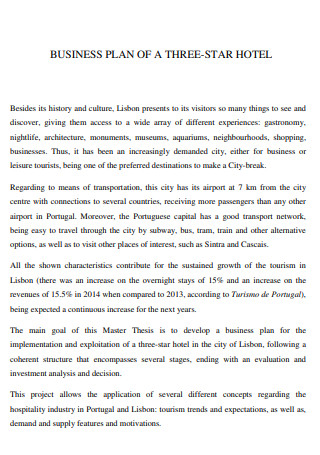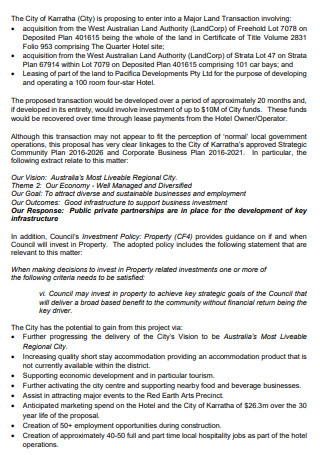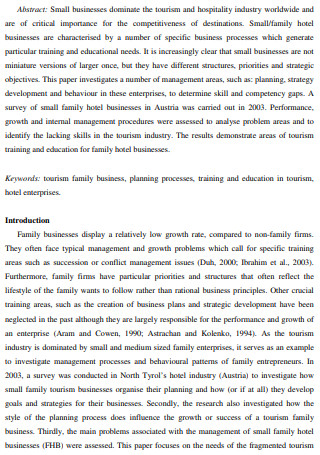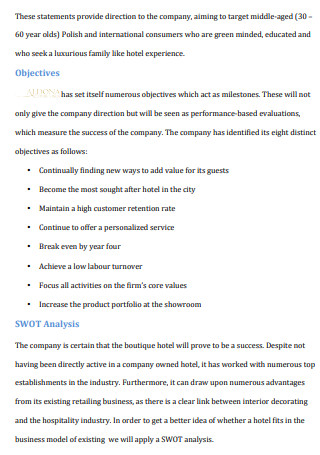3+ SAMPLE Hotel Business Plan
What Is a Business Plan?
A business plan is a legal document of its objectives, the rationale for achieving them, and the strategies. Additionally, the business plan may include background information on the team or organization presenting it. A business plan’s format and message may be altered depending on the audience to which it is given. If the business plan is to be presented to bank personnel, the emphasis will be on the bank personnel’s interests. As a result, a single business may have multiple business plans. Additionally, business plans may include them alongside more detailed plans about the company, such as financial, operational, and strategic plans. Despite the outlay of planning people put into their vacations and retirement, statistics reveal that just 20% of business owners have a written plan. Only one in three routinely spend time revising their growth strategy.
Elements of a Business Plan
There is no one-size-fits-all format for a business plan. Even if they address the same audience, writing a business plan will almost certainly vary from company to company. However, all business plans must include certain critical elements or sections. These sections are crucial in ensuring that the business plan conveys its message to its intended audience. A business plan must consist of the following areas to be effective.
How To Start a Hotel Business
Are you interested in learning how to start a hotel business? You are not alone in this. In 1768, one of the first hotels in the modern era opened in Exeter, England. Today, the industry has grown to become one of the world’s largest. However, fantasizing about starting a hotel and doing so are two entirely different things. That is where we enter the picture. We’ll walk you through the method of planning a hotel business in this guide, complete with step-by-step instructions, expert advice, and actionable tips. Here are the steps in creating a hotel business.
Step 1: Identify a market need.
When studying how to establish a hotel business, the first and most crucial step is to understand the hospitality sector globally and locally thoroughly. To get started, choose your favorite hotel news sources and schedule time to read them each day or week. After gaining some experience in the department, it’s time to conduct market research for your hotel.
Step 2: Create the strategic objectives for your hotel.
Once you’ve identified market needs, you’ll need to develop a sensible solution to address them. If approached carefully, your unique blend of amenities, concept, decor, marketing, location, and services can help you stand from the pack and gain market share. When developing your goals, consider tackling pricing, revenue management, sustainability, customer satisfaction, events, and other market needs. Ascertain that your goals are determined in part by the market’s and your target audience’s needs, as well as your business’s needs. This way, you can ensure that everything you do benefits both your customers and your bottom line.
Step 3: Calculate the numbers.
With your objectives and strategy in place, it’s time to crunch the statistics to ensure your venture will be lucrative. Using your market research, you may estimate crucial elements such as room price, vacancy rates, RevPAR, and operational expenses. A rudimentary understanding of hotel finances can assist you in subsequently hiring the appropriate revenue management and sales team. Profitability and any external issues affecting your hotel business are the two primary areas to concentrate on. Additionally, you’ll need to evaluate the startup expenditures for your hotel business. This comprises startup and employment expenditures, licensing and permitting fees, construction and refurbishment costs, and the first year of operations.
Create a few scenarios in your projections to understand how significant decisions affect your business’s prospective profitability. For instance, do you wish to purchase or construct? Unless significant renovations are required, buying a franchise or acquiring an existing hotel facility has reduced initial expenses. However, it requires you to develop your new hotel’s identity, which can be difficult depending on the business’s health at the time. On the other hand, while establishing a hotel is typically more expensive up front, it can address a shortage of available space and can be more profitable in the long term.
Step 4: Examine your hotel’s financing options.
Once you’ve determined the most appropriate financial strategy for your firm, you’re ready to fund it. There are a variety of financing alternatives obtainable for your hotel business. These include the hotel’s real estate and cash flow predictions and computations produced throughout the underwriting process. It’s critical to grasp the complete range of financial choices available for the financing of your hotel. You’ll receive credit lines based on near-term assets using specialist credit. This might be hotel equipment or accounts receivable invoices. The notion is that these collateralized debt obligations are more liquid than those required for traditional lending.
Traditional and special financing are both viable options for hotels, depending on their financial requirements. However, the larger and more established a hotel franchise is, the more specialty lending may make economic sense on an ongoing basis. This is because significant hotels are responsible for effective receivables management. Take into account the volume of credit card transactions that must be processed. Additionally, operations of hospitality-related vendors occur within the facility. The more extensive your AR activities, the more value you may derive from AR-based asset lending and comparable specialty lending.
Step 5: Carry out your documents.
Numerous critical, legal, regulatory, and insurance criteria must be met before starting any new firm. Your hotel operation is no exception. Consult your legal, insurance, accounting, and operations departments to ascertain the location’s requirements. You’ll need to establish a business structure and obtain business insurance, at the very least. You will undoubtedly require building or renovation permits, hotel licenses, and food and beverage service licensing. Also, there will be several health and safety standards as part of the construction or restoration process. While all of this documentation is not the primary reason for entering the hospitality sector, it is necessary. Collaborate with your team to verify compliance with local, state, and federal standards. Additionally, maintain control of the process throughout to avoid costly mistakes afterward.
Step 6: Employ and Train Personnel
A firm is as great as its team members. By recruiting exceptional personnel at all levels, you’ll position yourself to provide value to your guests and establish a market leadership position. Numerous hotels choose to employ executive and departmental jobs first, setting the tone and direction of the organization. These leaders can then determine what they wish to see within their teams and the appropriate staffing levels. Each team should define the responsibilities and talents they seek and design a strategy for contacting and sourcing qualified new workers. Ascertain that your application and interview processes are simple for candidates to avoid adding unnecessary friction.
Find ways to express your primary mission, beliefs, and approach to your new firm throughout the hiring process. This will aid in the recruitment of applicants who share your vision. Once you’ve engaged an exceptional staff, invest time in onboarding and training them. This is an important step that will benefit the entire community in the long run. Employees who will deal with guests should obtain additional training in customer service and guest relations to be prepared to provide a hand, regardless of whether it is part of their job description. Concentrate your efforts from the start on becoming the employer of choice in your market. You’ll attract an elite staff eager to assist you in becoming a market leader.
FAQs
What is the function of a hotel business plan?
Hotel business plans ensure that you have put in place all of the essential components for your hotel’s future growth. It assists in comprehending and acknowledging all of your ambitions and objectives, as well as how you might reach them. This document will adapt in response to the growth and changes in your hotel.
Is a degree required to own a hotel?
Hotels and resorts require many entry-level team members, and entry-level occupations frequently do not require a diploma or degree. Indeed, businesses seeking candidates to answer phones, work in cleaning or maintenance, or provide room service may be unconcerned about prospective workers’ educational backgrounds. Financial returns score highly among the reasons for hotel investment, according to research. That might mean a sizable profit from the hotel’s operating cash flow, especially if they intend to own the property for an extended time.
What qualifications are required to work as a hotel manager?
While excellent communication, interpersonal skills, attention to detail, operational expertise, leadership, team building, financial abilities, and flexibility are all necessary characteristics for success in this industry, they are far from the only ones.
Numerous people have fantastic business ideas. However, this is irrelevant. The distinction between dreamers and entrepreneurs is in their attitude toward action. Are you prepared to take your concept to market? The first move is to list down your thoughts. Whether your business is a rural refuge or a luxury bed and breakfast, these sample business plans for hotels, inns, resorts, and other lodging establishments can assist you in writing a program that will guide you to success. I hope the tips and template will aid you in developing an effective hotel business plan. Pursue your desires and make them a reality!




